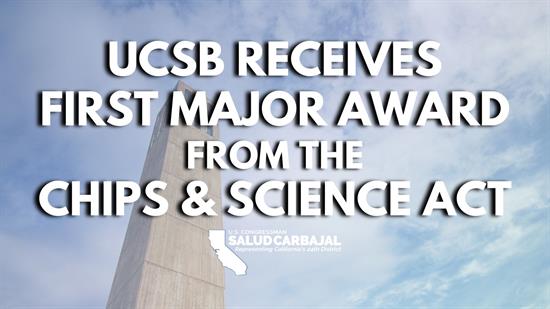Rep. Carbajal Congratulates UCSB for Receiving Portion of First Major Award from CHIPS and Science ActUC Santa Barbara will be part of one of eight Microelectronics Commons regional innovation hubs funded through the CHIPS and Science Act, which was enacted with Carbajal’s help last year
Washington,
October 4, 2023
Congressman Salud Carbajal (CA-24) is highlighting that UC Santa Barbara will be one of the beneficiaries of the first major award from the CHIPS and Science Act, the landmark manufacturing and research law that he helped pass in July 2022. A $27 million award funded by the 2022 law was announced by the U.S. Department of Defense for the California Defense Ready Electronics and Microdevices Superhub, which includes UC Santa Barbara along with 15 other institutions. “I am proud to have worked with my alma mater to ensure that UC Santa Barbara is part of this critical research – including passing this landmark law and working with them to secure this important investment,” said Rep. Carbajal. “The United States pioneered the microchip in the last century. Now, UCSB will be part of our efforts to once again put our nation on the cutting edge of semiconductor R&D – driving innovation in America and helping ensure critical components like these are immune to international supply chain shocks like we saw last year.” “The UC Santa Barbara NanoFab has served as an innovation center for years by supporting the research of hundreds of users from academia, industry, and the government and fostering an ecosystem of startups and innovation in the Santa Barbara community. We possess the knowledge, experience, world-class facility, and expert staff to do that at a grander scale and expedite the lab-to-fab process to deliver impactful technologies and solutions,” said Umesh Mishra, Dean of UC Santa Barbara’s College of Engineering. "We at UC Santa Barbara are enthusiastic to be a part of this Hub Team and look forward to the start of the program," said Jonathan Klamkin, Ph.D., Professor of Electrical and Computer Engineering and Director of the UCSB Nanofab. This is the largest award to date from the CHIPS and Science Act, funding the establishment of eight Microelectronics Commons (Commons) regional innovation hubs, two of which will be centered in California. "The Microelectronics Commons is focused on bridging and accelerating the lab-to-fab transition, that infamous valley of death between R&D and production," said Deputy Secretary of Defense Kathleen Hicks. "President Biden's CHIPS Act will supercharge America's ability to prototype, manufacture, and produce microelectronics scale. CHIPS and Science made clear to America — and the world — that the U.S. government is committed to ensuring that our industrial and scientific powerhouses can deliver what we need to secure our future in this era of strategic competition." The Microelectronics Commons program aims to accelerate domestic hardware prototyping and "lab-to-fab" transition of semiconductor technologies. This will help mitigate supply chain risks and ultimately expedite access in the United States to the most cutting-edge microchips. The Hubs are expected to spur economic growth across their respective regions and the economy at large. Hubs are charged with developing the physical, digital, and human infrastructure needed to support future success in microelectronics research and development. This includes building education pipelines and retraining initiatives to ensure the United States has the talent pool needed to sustain these investments. You can learn more about the CHIPS and Science Act here. You can learn more about the Microelectronics Commons program here. |
- Home
- About
- Services
- Help with a Federal Agency
- Congressional Art Competition
- Congressional App Challenge
- Congressional Commendations
- Congressional Women of the Year
- Flag Request
- FY2027 Appropriations Requests
- FY2027 National Defense Authorization Act Requests
- FY26 Community Projects
- Know your Immigration Rights
- Grants
- Internships
- Military Academy Nominations
- Tour Requests
- Issues
- Media
- Contact



